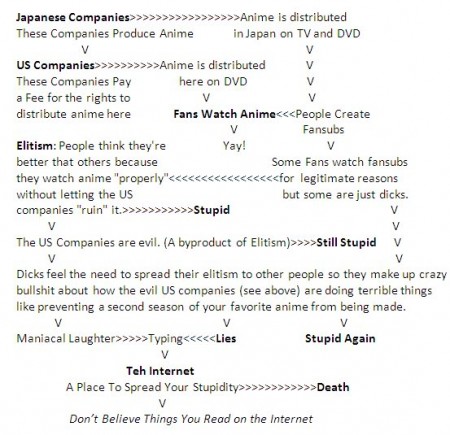Ask John: How Does One License Anime?
Question:
I was wondering how does one license anime titles?
Answer:
The American anime distribution industry is notorious for keeping its corporate secrets very private. Given the relative insularity of the industry and the fact that sharing corporate secrets can have a significant, appreciable impact on not only companies but even individual employees’ livelihood, the tendency to keep secrets within tight-lipped company is understandable. Somewhat ironically, even though I was personally involved in multiple anime title licensing negotiations when I worked with AN Entertainment, I’m still rather unfamiliar with all of the varying contingencies of the deal. However, my own experience, and my observation of the domestic licensing industry, suggest to me that acquiring American distribution rights to anime may not be difficult in the particular way that most Americans assume. American otaku typically assume that the foremost necessity for arranging an American licensing contract is a big pile of money. On the contrary, although money is important and necessary, the most important necessities for licensing anime for American release are professionalism and contacts.
Many of America’s anime distributors have been affiliates or subsidiaries of Japanese studios or distribution companies, thus giving them contacts with Japanese master licensors from their inception. Viz Media, Bandai Entertainment, Pioneer/Geneon, Synch-Point, and Super Techno Arts all had licensing contacts at their founding. Certain companies were established as a result of contacts in the Japanese industry. FUNimation founder Gen Fukunaga’s uncle is Dragon Ball producer Nagafumi Hori. According to rumor, Urban Vision founder Mataichiro Yamamoto was a close friend with a producer at Madhouse, resulting in Urban Vision acquiring rights to numerous Madhouse productions. But particularly companies including AD Vision, Media Blasters, Right Stuf, and AnimEigo, to name a few, launched without pre-existing Japanese contacts or affiliations. AN Entertainment was founded the same way.
In the late 1990s I was a patron at an underground video rental store in Ybor City, Tampa, owned and managed by Steve Biro. Steve happened to be friends with a former Hollywood film executive. Steve’s intention was to utilize his Hollywood contact to establish international licensing networks to acquire underground live-action horror films and possibly, as a supplement, select anime titles. Steve launched Unearthed Films. Since I spent a great deal of time at his store talking movies with him, I introduced Steve to AnimeNation founder Gene Field. As a result, Steve and his friend passed along contact information for a licensing agency based in Tokyo. I was tasked with developing a list of titles that AnimeNation might be interested in licensing. We sent the list to the licensing agent, who shortly later returned the list with annotations noting which titles were and weren’t available for foreign licensing. With my input, AnimeNation narrowed down the list and began negotiating licensing fees.
More recently, in 2008 St. Louis, Missouri-based Anime Midstream launched without, as far as I know, any pre-existing connections to the Japanese production industry. Selby Johnson personally launched Discotek Media in Altamonte Springs, Florida, in 2005. And last year, Georgia college student Corey Maddox was able to establish Crimson Star Media and negotiate a licensing agreement with Pony Canyon for the 2006 Hanbun no Tsuki ga Noboru Sora television series. Although Maddox’s licensing contract went unfulfilled, notwithstanding, he did manage to establish an initial, tentative license by himself. So evidence clearly illustrates the fact that even singular individuals with no experience in or prior contacts with the Japanese anime production or distribution industry can still successfully negotiate American licensing contracts. What’s necessary to actually negotiate contracts is an awareness of precisely who to contact to begin business negotiations with, and a professional presentation that will convince a Japanese distributor to take the licensing offer seriously. After all, Japanese companies want their anime to generate revenue. They want to license their anime titles for international distribution. However, they have to be convinced that the individuals and companies that they partner with are professional, capable, and trustworthy. Money is, of course, necessary, but money comes later. Without contacts and a professional demeanor, licensing negotiations will never even reach the point of discussing financial arrangements.
Most of Japan’s anime industry now already has contact with and licensing arrangements with domestic distributors. So once a serious discussion is established, the Japanese distributor can offer initial licensing terms and stipulations. And once a domestic distributor has a title successfully released, Japanese distributors will approach the American licensor with offers of additional licenses. In the case of AN Entertainment, as soon as we successfully released Risky Safety, screener tapes, licensing offers, and even co-production offers for titles including Yumeria, Yugo, Afro Samurai, Pita-Ten, Kimagure Robot, Yoshimune, and even Jarinko Chie came flooding in.
Add a Comment
You must be logged in to post a comment.



Really loved this article. Particularly how it began since it is very true that the American anime distribution industry never reveals details such as which anime sold more given a certain month when they released a certain number of anime releases.
Understandable but very hush, hush. Enjoyed reading.